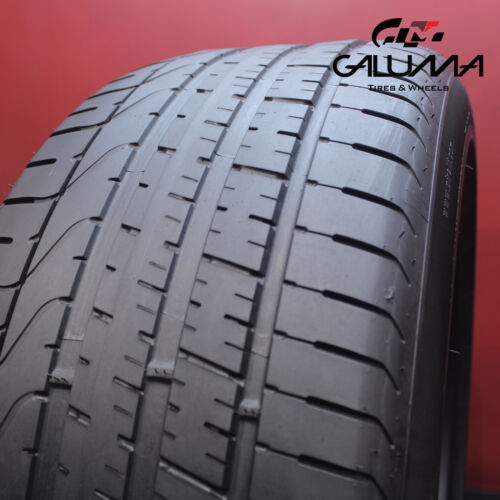

CINTURATO P7TM ALL SEASON
(185/55 R15) 82H (KS)

All season
QTY OF
TIRES: 4
$ 418.32



CINTURATO P7TM ALL SEASON
(185/55 R15) 82H (KS)

All season
QTY OF
TIRES: 4
$ 418.32
No account? No problem!
Check Out as Guest

CINTURATO P7TM ALL SEASON
(185/55 R15) 82H (KS)

All season
QTY OF
TIRES: 4
$ 418.32
No account? No problem!
Check Out as GuestShop Products

Research & Advice

Delivery & Installation

Why Galuma

Customer Support
954-366-5694

Shop Products
Wheels


Tire

Tires
Select the tires you need to
your vehicle, search tires by
size or by brand

Research & Advice
Resources


Research & Advice

Help & Advice
Learn More About Galuma Tires & Wheels

Research & Advice

Resources
Learn More About Galuma Tires & Wheels

Delivery & Installation
Service


Delivery & Installation

Delivery
Knows about the way we ship your tires and wheels

Delivery & Installation

Services
Know the services we offer in our state-of-the-art facility






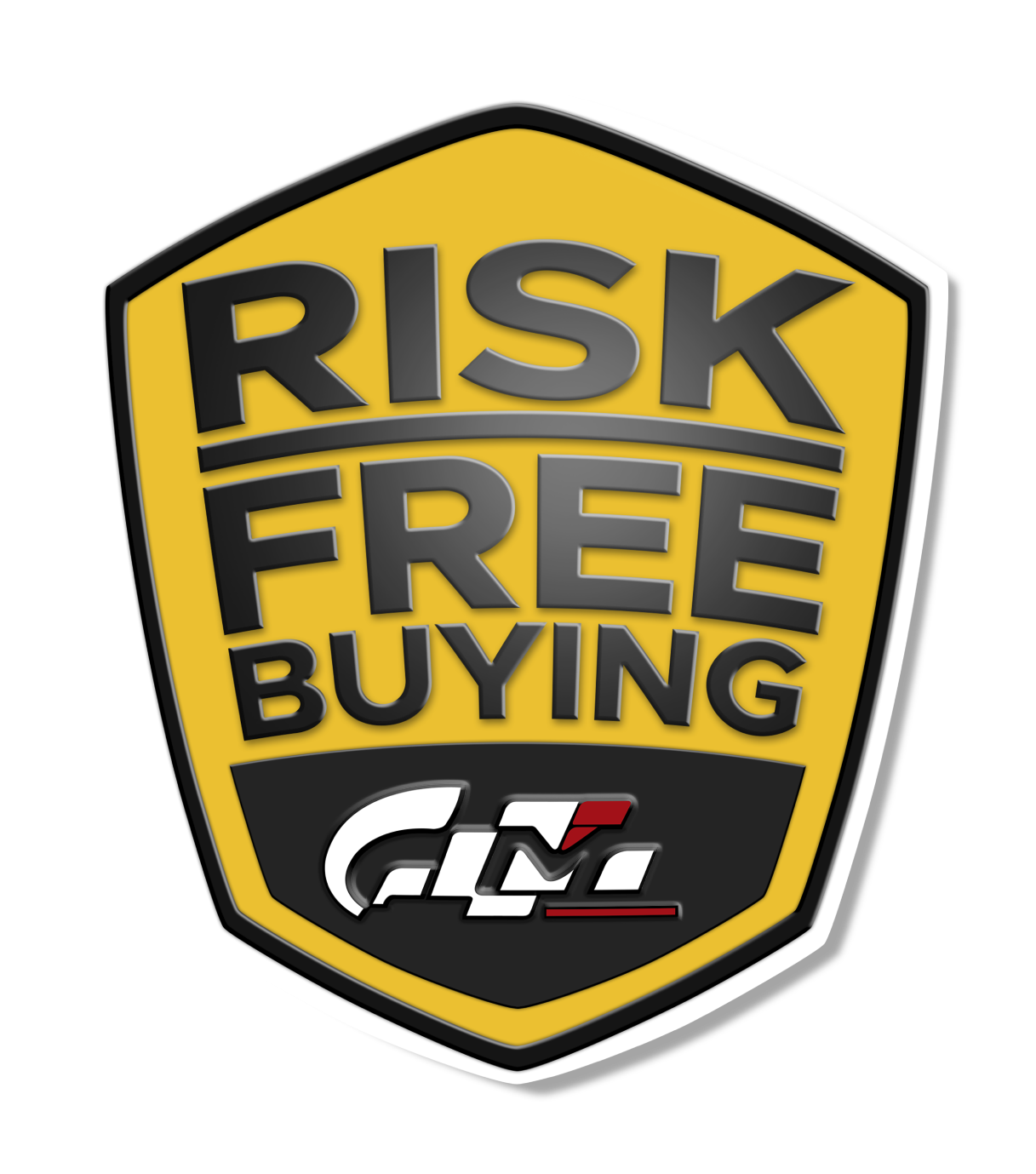

Thank you for contacting us!



want to make something clear before... We are ALWAYS willing to work out any problems that may arise, regardless of what they may be, but you have to communicate with us first. We cannot fix a problem if we do not know that the problem exists. We answer all questions from buyers in a fast and efficient manner. We describe every item we sell to the best of our ability and with complete honesty, so please expect what is seen in the listing ad "no more or less" just the pictured tires.
If we can maintain positive feedback rating with satisfied individual customers in the thousands after all this time, it's because we are honest, a fair seller, and the ratings reflect that. We will do everything we can to keep all of our buyers satisfied.
We’ll ship every single item we sell either on the same day that the payment was received or the following business day. In return for what should be considered some of the best possible service available on all of e-commerce, we only ask for two things: if there is a problem, please contact us through "messages" and we will rectify the problem. Secondly, we ask that you take the time to write the best available review across the board in any categories.
How to find tire age?
The sidewall of a tire tells you a lot about it-everything from its name to its size. To check the age of your tire, you need to find the DOT number. The Department of Transportation puts a DOT number on every tire manufactured for sale in the United States. It's next to the size information. The DOT number appears in a smaller type than the size code. during the second inspection. We guarantee no sidewall repairs and no plugs. the patch maybe close sometimes but never in the middle of the sidewall area, Professional repairs are safe to drive on and are not noticeable. All repaired tires are carefully checked with air and guaranteed to last, we only sell used tires, with original casing, no retreaded or grooved.
1. Locate your tire’s DOT code
Check the sidewall for “DOT” followed by up to 13 letters and numbers. A tire’s sidewall is the smooth part of the tire outside the rim before the tread starts. Check both sides of the tire if you see an incomplete code on the outside—the full code is legally required to be printed onto one sidewall in the US, but there may only be a partial code printed on the other.
2. Read the last 4 digits of the DOT code
Post 2000, Look for 4 numbers ending with 2 digits that look like a past year. The first 2 numbers tell you the week the tires were manufactured, and the last 2 tell you the year. If you see 2718, for example, that means the tire was made in the 27th week of 2018.
3. Look at the last 3 digits of the DOT code
Pre 2000, Look for 3 digits at the end of the DOT code if your tires are very old. Like newer codes, the first 2 numbers tell you the week of the year the tires were made. The third number tells you the year, but doesn’t specify the decade since it was assumed the tires would be replaced within 10 years
What means the DOT number?
This DOT number (also called the Tire Identification Number or TIN) is contained in a sequence of up to 12 letters and numbers that signify the tire size, the manufacturer, the specific plant where it was built and when it was built.
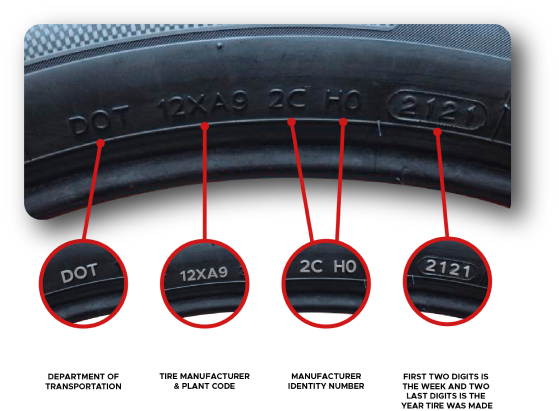

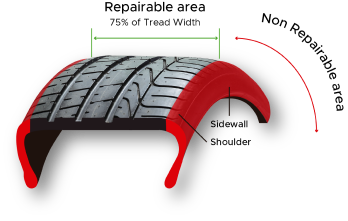
Can my tire be repaired?
If a tire can be repaired, can only established once the tire is stripped from the wheel. This allows for an inspection of the damage and the structural integrity of the tire.
Although some information would indicate that a tire can be repaired, the damage must be assessed for the size and angle of the puncture, along with the internal inspection, to see if a repair is possible.
If a tire suffers from a major puncture to the tread, on the tire sidewall or the shoulder it will be deemed unrepairable. If this happens, a new tire will be needed to replace the punctured one
What causes a flat tire?
A flat tire is generally caused by a puncture to a tubeless tire’s casing, allowing air to escape and causing the tire to deflate. Punctures are usually caused by sharp objects like small nails, screws, glass shards and other road debris. A flat tire can also be caused through a damaged sidewall or leaking valve.
How do we repair a puncture?
The function of a puncture repair is twofold. Firstly, it seals the tire to ensure that it will hold air. Secondly, a repair will seal the tyre's casing to prevent moisture or contaminants from entering the tire casing or structure which can lead to tread separation or further damage.
A correct repair, seals the innerliner (the part of the tire that replaced the inner tubes and the only part designed to retain air) and fills the part of the injury. Combination of patch & plug or specific “mushroom” patch that combines the functions. The patch on the inside reseals the innerliner to restore air contaminent and the rubber filler inserted through the injury prevents moisture from reaching the steel belts and body cord.
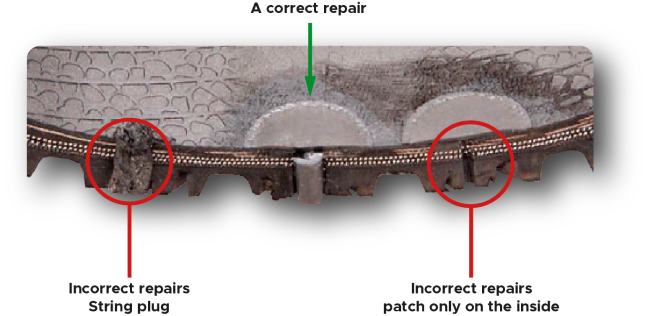
Incorrect repair, patch only on the inside
Reseals the innerliner but does not fill the path of the injury. This allows moistureto follow the path of the injury and reach the steel belts (causing them to rust) and/or the body cord.
Incorrect repair, string plug through the path of the injury
Often done as an external repair without inspecting the interior of the tire for damage. Fills the path of the injury, but does not guarantee sealing of the innerliner. This may allow air to migrate through the rubber as well as escape from the tire.

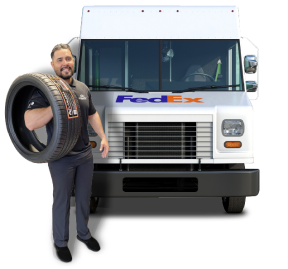
If you decide you no longer need/want a tire that you purchased from us. You have 1 YEAR to return the item for any reason to us in it’s original condition. NO RESTOCKING FEE will be applied, you will need to ship it back at YOUR OWN expense before you can receive a refund. You have 1 YEAR to initiate a return.
Returns must be uninstalled nor used, in the condition you received it with all the original tags, no torn tags, no exceptions! Please keep the tires unexposed to water or sun to avoid dry rotting. Otherwise, we will reject your money refund due to bad conditions.


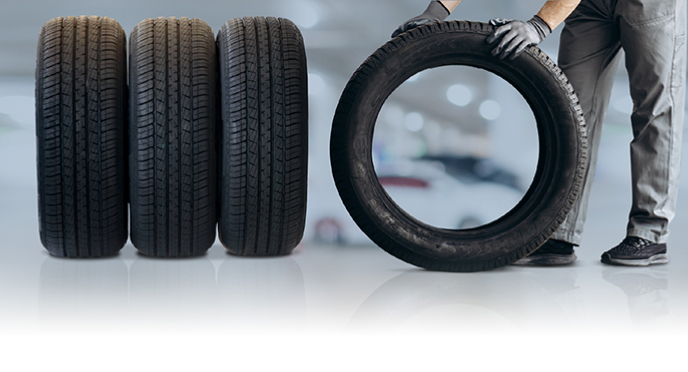
Tires are your connection to the road and ultimately, your safety, and there’s nothing Galuma Tires & Wheels takes more seriously. That’s why we offer a full range of payment options and terms. Also, we count with a State of the art facility for high performance installations. With Galuma Tires & Wheels, there’s no need to wait to get the tires you need. Chosee from: Cash On Site, Visa, Master Card, Amazon Pay, all Stripe services, Afterpay and Affirm.

Width
The first number to appear in your tire size information is the width, in millimeters, of the correct tires for your vehicle: P245/35ZR20 91Y. Tire width always refers to the measurement from one sidewall to another. Thus, a tire with the measurement “P245” is for a passenger vehicle and has a nominal width of 245 millimeters.
Aspect Ratio
After the slash mark, the next number you see is for the tire’s aspect ratio, which essentially tells you how tall your tire’s profile is: P245/35ZR20 91Y. Aspect ratios are delivered in percentages. Tire makers calculate the aspect ratio by dividing a tire’s sidewall height by its width “P245”. If a tire has an aspect ratio of 35, it means the tire’s height is 35% of its width or “P245”.
Rim Diameter
The next number is the wheel’s diameter. For example, a tire with the P245/35ZR20 91Y would fit a rim with a 20-inch diameter. Take note: if you decide to change your rims’ size, you will also need to get new tires that are compatible with the change in size. Tires designed to fit a 20-inch wheel diameter will not stretch to fit on new 22-inch rims.
Load Index
It is called the load “index” because the figure doesn’t tell us the precise number of pounds the tire can support, at least not by itself. Instead, the number corresponds to a specific load capacity listed in an index. Beginning with one and ending with 150, numbers in the load index represent carrying capacities of 99 to 7385 lbs.
Speed Rating
The final figure in a tire size sequence is the speed rating indicated by a letter: P245/35ZR20 91Y. Just as your load index number corresponds to a particular load, your speed rating letter corresponds to a specific speed capability based on a standardized laboratory test. Here are the most common letters for speed ratings and their corresponding maximum speeds:
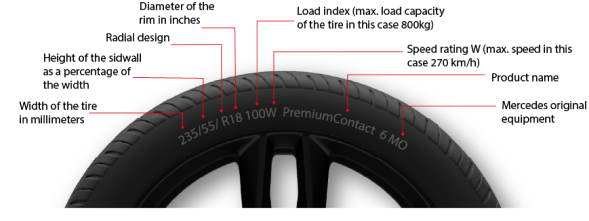

You’ve got questions, we have answers. Below is a list of the most common questions from our customers.









All orders placed and paid before 4:30 pm Eastern time ship the same day. Delivery time will vary (1 - 7 business days) depending on destination. Tracking numbers are emailed once the order is placed. Please contact us if you do not receive a tracking number.
Galuma Tires & Wheels uses only FedEx, which varies in delivery time. All tires are shipped FedEx standard ground to any destination, we offer FREE SHIPPING within the 48 contiguous States. We will not be responsible for shipping delays after products have left our warehouse. Orders placed by credit card will only be shipped to the billing address of that card.
No P.O. Box or APO addresses will be accepted.
For shipments to Alaska, Hawaii, and Puerto Rico, please contact us for details and pricing BEFORE you place your order.
Any orders over a total of $750 will require a signature upon delivery.
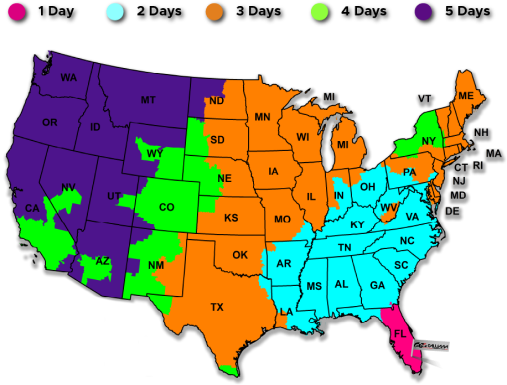




We want to make something clear before... We are ALWAYS willing to work out any problems that may arise, regardless of what they may be, but you have to communicate with us first. We cannot fix a problem if we do not know that the problem exists. We answer all questions from buyers in a fast and efficient manner. We describe every item we sell to the best of our ability and with complete honesty, so please expect what is seen in the listing ad "no more or less" just the pictured tires.
If we can maintain positive feedback rating with satisfied individual customers in the thousands after all this time, it's because we are honest, a fair seller, and the ratings reflect that. We will do everything we can to keep all of our buyers satisfied.
We’ll ship every single item we sell either on the same day that the payment was received or the following business day. In return for what should be considered some of the best possible service available on all of e-commerce, we only ask for two things: if there is a problem, please contact us through "messages" and we will rectify the problem. Secondly, we ask that you take the time to write the best available review across the board in any categories.

Don't be fooled by other online tire sellers using stock pictures to make a tire sale! Your safety comes first for us. The photographs you see below are the tires you will receive. We do not use fake photos. We do not give surprices, only excellent quality.
We inspect our tires visually, air pressure test under 60 psi to detect any bubbles or broken belts, and last dunked into water for leak detection. These tires have passed our three stages of inspection, and now ready for sale since it is free of any bubbles, broken belts or leaks. We do not perform high speed balance test on our tires.
Please remember you are buying a USED tire; We guarantee no sidewall repairs and no plugs. The patch may be close to, but never in the middle of the sidewall area. Professional repairs are safe to drive on, are not noticeable and are guaranteed to last! Our patch repair exceeds the repair standards, due to it, we use a special compound "substance", to protect the integrity of the patch repair.
Before shipping, some of our tires are spray painted with a white color to separate them from the ones that have not been inspected and not ready for shipping. This is to assure that our customers will receive a perfect product before being ready and shipped.


Welcome to
live chatHello! Thank you for contacting us!

Welcome to our live Chat! Please fill in the form below before a starting the chat.


Contact us by Email
We will reply as quickly as possible

When you have a flat tire, your primary goal is to get back on the road. Typically, this
involves removing the punctured tire and fitting your spare, ensuring you do this safely
away from traffic.
Consult your vehicle's owner's manual for detailed instructions on how to remove the
punctured tire and fit the spare.
It’s crucial to have the punctured tire repaired as soon as possible,
especially if your spare
is a space saver or speed-limited type.


Causes of a Flat Tire
A flat tire usually results from a puncture in the casing of a tubeless tire, allowing air to
escape and causing deflation. Common causes include sharp objects like nails, screws,
glass shards, and other road debris. Flats can also occur due to a damaged sidewall or a
leaking valve.

Can my tire be repaired?
Determining if a tire can be repaired requires removing it from the wheel for a thorough
inspection. The size, angle of the puncture, and the tire's structural integrity are assessed
to see if repair is possible.Major punctures in the tread, sidewall, or shoulder generally render a tire
unrepairable,
necessitating a replacement.

Repairing a Puncture
Puncture repair serves two purposes: sealing the tire to hold air and preventing moisture
or contaminants from entering the tire casing, which could lead to tread separation or
further damage.
Repairing a puncture generally takes about 30 to 45 minutes. The procedure includes removing the flat tire from the rim, thoroughly inspecting the tire's internal components, assessing and repairing the puncture, and then refitting the tire to the rim. After this, the tire is balanced on the wheel before being reinstalled on your vehicle. Finally, your spare tire is returned to its storage location.
Repairing a puncture generally takes about 30 to 45 minutes. The procedure includes removing the flat tire from the rim, thoroughly inspecting the tire's internal components, assessing and repairing the puncture, and then refitting the tire to the rim. After this, the tire is balanced on the wheel before being reinstalled on your vehicle. Finally, your spare tire is returned to its storage location.

Seeing a flat tire when you’re about to drive is one of the last things any driver wants. Not only does it mean you need to install the spare tire, but you also have to get the punctured tire repaired.

When dealing with a punctured speed-rated tire, there are additional considerations. Some manufacturers permit a tire to retain its speed rating if a specific multi-step repair procedure is strictly followed. However, most manufacturers can't guarantee that the tire will maintain its high-speed capability after repair due to the unknown extent of the damage and the repair quality.

It's crucial to avoid repairing a tire without first removing it from the wheel. Without inspecting the tire's interior for hidden damage, there's a risk of returning a compromised tire to service.

When repairing a punctured tire, there are three main considerations: evaluating the damage caused by the object that punctured the tire, reestablishing an airtight seal on the tire’s inner liner, and completely filling the path the object took through the tire.
Can Run-Flat Tires Be Repaired?
Run-flat tires offer temporary mobility at up to 50 miles per hour for up to 50 miles post-
puncture. However, driving on them with low or no air pressure can permanently damage
their structure.
Galuma Tires & Wheels recommends driving at the slowest safe speed below 50 mph and
the shortest distance to a service provider.
Even trained tire specialists may struggle to confirm internal damage on run-flat tires
driven underinflated, making repair or reuse determination difficult. Consequently,
Galuma Tires & Wheels and many manufacturers recommend replacing run-flat tires
driven underinflated or at zero pressure.

U.S. Tire Manufacturers Association (USTMA) Policies
The USTMA, which includes most major tire manufacturers, sets industry policies that
companies use to define their positions. They provide training and guidelines to ensure
proper tire repair. While basic USTMA procedures apply to both run-flat and non-run-flat
tires, many manufacturers have specific policies that may supersede standard
reparability guidelines.
Selected Tire Manufacturer's Policies for Run-Flat Tire
Repair
The following list summarizes tire manufacturers' run-flat tire repair policies, however it should be noted
that every tire
manufacturer that consents to repair, does so only after the punctured tire has passed a thorough exterior
and interior
examination.
| Manufacturer/Brand | Repair policy | Additional Provisions |
|---|---|---|
| BFGoodrich | Permitted | 1 repair maximum |
| Bidgestone | Permitted | Only if 15 psi mantained |
| Continental | Does not recomend | Mfg. Road Hazard Program* |
| Dunlop | Permitted | 1 repair maximum for H- and greater speed ratings |
| Firestone | Permitted | Only if 15 psi mantained |
| Goodyear | Permitted | 1 repair maximum for H- and greater speed ratings |
| Hankook | Permitted | |
| Kumho | Permitted | |
| Michelin | Permitted | 1 repair maximum |
How to read my tires?
Find out hereHow to pick up my tires?
Learn moreHow to contact Us?
CallWhatever your budget or payment preference,
Galuma Tires & Wheels can deliver
With Galuma Tires & Wheels, there’s no need to wait to get the tires you need. We offer a variety of flexible payment options to make your shopping experience as convenient as possible. You can pay for your purchase using major credit cards, including Visa, MasterCard, and American Express, Cash On Site, Amazon Pay, all Stripe services, Afterpay and Affirm. No matter which method you choose, you can shop with confidence knowing your transactions are safe and secure.

Please call us at 954-366-5694
Our customer service opening hours are:
Monday - Friday 9:00am - 6:30pm
Saturday 10:00am - 5:00pm
Click To ContactPlease call us at 954-366-5694
Our customer service opening hours are:
Monday - Friday 9:00am - 6:30pm
Saturday 10:00am - 5:00pm
Click to contact